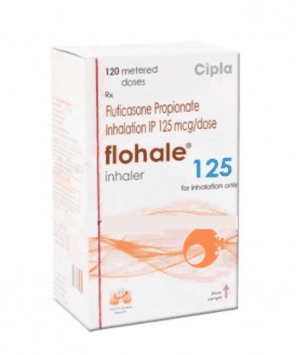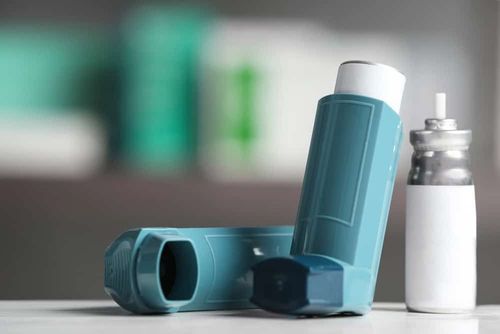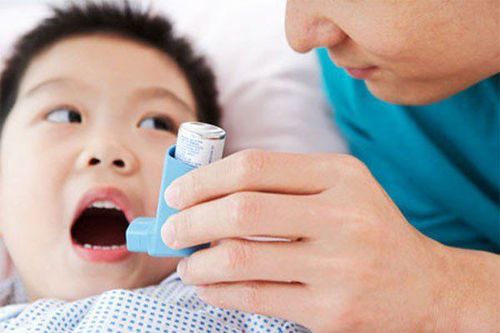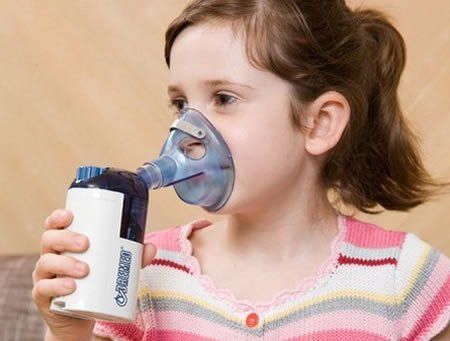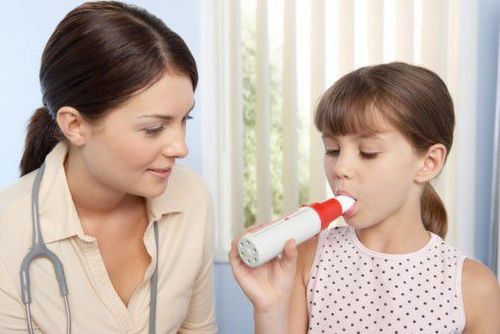This is an automatically translated article.
The article was professionally consulted by Associate Professor, Doctor, Doctor Nguyen Thi Hoan - Vinmec Times City International General Hospital.Asthma is a chronic inflammatory disease of the airways that causes intermittent airway obstruction. Manifested by wheezing, shortness of breath, chest tightness and persistent cough from small to large, often appearing at night and early in the morning.
1. What is bronchial asthma?
Asthma is a chronic inflammatory disease of the airways that causes intermittent airway obstruction. Manifested by wheezing, shortness of breath, chest tightness and persistent cough from small to large, often appearing at night and early in the morning.The disease is common in children < 5 years old and often has recurrent wheezing symptoms.
2. Manifestations of bronchial asthma
2.1. Appearance characteristics: Intermittent, transient wheezing: due to viruses or weather changes, seasonal allergies,... no wheezing between episodes, wheezing attacks appear before 3 years of age. Persistent wheezing episodes, wheezing symptoms appear as above but persist until after 6 years of age. 2.2. Typical asthma: Starts with inflammation of the upper respiratory tract with a runny nose,... A wheezing asthma attack appears in the middle of the night with a whistling sound. Examination: Pulmonary auscultation with many crackles and snoring rales. 2.3. Atypical asthma: There is inflammation of the upper respiratory tract and wheezing, lung examination has rales and rales.3. Testing
Blood count showed eosinophilia. In case of superinfection there is an increased number of white blood cells and neutrophils. Chest x-ray showed pneumothorax.4. Causes of bronchial asthma
Virus: The most common cause in 85% of cases of acute asthma is Rhinovirus, Coronavirus, Influenza virus, RSV respiratory syncytial virus. Other causes of asthma: Environment: Dust, house bugs, pollen, pets, mold, tobacco smoke, honeycomb,... Food like eggs, cow's milk, soybeans, fish, shrimp ,... Other diseases: Gastroesophageal reflux disease, fever, dehydration,... Family factors of children with asthma: Parents with a history of asthma or allergies.5. Treatment of bronchial asthma
Mild asthma: Inhalation Ventolin 0.05-0.15mg/kg/repeat after 30 minutes or give bronchodilator salbutamon (Ventolin, Solmux Broncho,...), Terbutaline sulphate (Bricanyl,... ) clean the nose, clear the airways (Sterimar, sofmer,...) . Moderate asthma: Inhalation combination of bronchodilator ventolin with nebulized corticosteroids such as Fluticasone propionate (Flixotide), Budesonide (Pulmicort, Symbicort,...) Severe asthma attacks: Nebulized and oxygenated, giving resistance birth if there is superinfection. Malignant asthma: Requires emergency hospitalization, oxygen, nebulizer or intravenous injection of bronchodilators and corticosteroids, more severe may require intubation and mechanical ventilation.6. Prevention of bronchial asthma
Depends on the cause of the asthma. If due to Virus: need to isolate sneezing children with healthy children. If due to weather, season, allergic rhinitis, family history of parents with asthma or children with eczema, it is necessary to receive asthma prophylaxis. Preventive treatment of asthma in children according to the guidelines of the Global Asthma Control Program GINA “Inhaled drugs are fundamental in the treatment of asthma in children of all ages”.
Inhaled drugs: Fluticasone Propionate (Flixotide), Salmeterol/fluticasone propionate (Seretide). Oral drugs: Montelukast Na (Singulair, Montelukast,...).
Please dial HOTLINE for more information or register for an appointment HERE. Download MyVinmec app to make appointments faster and to manage your bookings easily.





